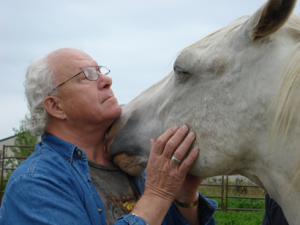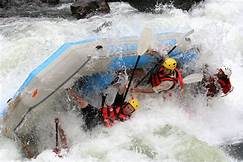When I first started working as a business development specialist, there were two primary areas that I focused my efforts on:
1) helping people get clear about what they wanted to create in their lives.
2) helping them take the actions necessary to create the desired results.
By applying problem-solving facilitation techniques, I quickly realized that I could help most people get clear about what they wanted to do, but when it came to implementation many people simply did not have the body for action.
With this in mind, I began my search for a better way to help people eliminate the inaction that holds them back. I decided to learn about personal coaching. At the time, “coaching” was a new term and the ideas were new, too. I studied at The Newfield Network and at the Strozzi Institute. Along the way I became aware of “equine-guided coaching” (EGC), a method of personal coaching that works with horses to raise an individual’s self-awareness and help them move through the barriers that are holding them back.
It’s a different kind of “horse sense”.

Some people feel they have experienced the spirit of a horse because they have ridden horses or grown up around horses. Experiencing horses in this way is not the same as experiencing EGC.
A typical paradigm that many have regarding horses often casts the horse in the role of working on a ranch, pulling a wagon, carriage or plow, riding the trails, running at racetracks, and performing in rodeos, but not working in the human improvement realm. We’re now talking about horses helping people get in touch with, and moving through their stuck areas. One of the great centered riding trainers, Mary Fenton, once said “The art of centered riding is more about teaching the human than the horse. If the person learns to be calm and centered, they will have a better connection with the horse.” EGC is extending this way of thinking to personal coaching and action.
A few examples of the ways people are helped through EGC include:
Post-Traumatic Stress Disorder (PTSD) sufferers – EGC methods are applied to the healing of war veterans, victims of violent crimes, and other sufferers of PTSD: Calico Junction New Beginnings Ranch, Inc. and Trinity Equestrian Center.
At-risk youth – EGC methods are now widely known to turn lives around for at-risk youth. Consistent use of the method has helped countess adolescents develop the confidence, calm, and focus necessary to avoid a life of gangs, crime, and incarceration. Read about EAP (Equine Assisted Psychotherapy) here.
Physicians improving their patient sensitivity – Dr. Beverly Kane of Stanford University uses EGC methods to raise doctors’ awareness and sensitivity to the patient, thereby improving the quality of care and lowering the number of malpractice lawsuits.
Autistic children – EGC methods are employed as therapy for children on the autistic spectrum, helping them develop emotional bonds, develop cognitive and language skills, and overcome sensory disorders.
Sexual abuse survivors – both men and women – have been tremendously helped doing therapeutic work with horses.Sexual abuse survivors find joy and healing through horse therapy and sexual abuse victims treated with equine therapy.
First graders learning about friendship.
 EGC methods have been employed as a way of helping children recognize and appreciate the differences among horses, and people. Through the process they get in touch with incidents of prejudice among humans, and learn about choosing a life of tolerance and acceptance.
EGC methods have been employed as a way of helping children recognize and appreciate the differences among horses, and people. Through the process they get in touch with incidents of prejudice among humans, and learn about choosing a life of tolerance and acceptance.
It’s not just extraordinary people in extraordinary circumstances who benefit from ECG and, in my mind, that is what makes equine-guided coaching so very powerful.
I have witnessed EGC methods helping everyday people get through major stuck areas of their lives (including me) and develop key leadership and teamwork skills.
After becoming aware of the breakthroughs that happened for people with EGC with my own powerful experience, I began to study various approaches in earnest. I attended workshops in California, South Dakota, Pennsylvania, Colorado, and Germany. Along the course of my studies, I came to know EGC pioneer, practitioner, and trainer Melissa Pearce of Touched by a Horse in Elizabeth, CO. Melissa’s approach of Equine Gestalt Coaching struck a chord with me, integrating two principles behind my own approach to coaching: helping people step through the gate to take action and living the good life on purpose. If you’re interested in doing this kind of work with horses I highly recommend Melissa’s certification program.
EGC has helped me personally break through things that were holding me back, and without it I would not be doing what I am doing today: living my life on purpose. The beautiful thing about EGC is that I’m able to recall the learning incidents visually and emotionally. The lessons are somatic experiences locked in my mind and body and are available for recollection any time I choose to bring them up.
Now it’s your turn.
Are you feeling stuck or struggling to take the action necessary to live the life you want or build the business you desire?
Could you benefit from the experience of working with an equine-guided coach to develop your leadership and team-building skills to better build your business?
Today there are many highly qualified EGCs throughout the United States, and I would be happy to help you find one that’s right for you. Please contact me if you would like a recommendation or leave a comment.
Larry Freeborg
Larry Freeborg is a life transition coach focused on working with people in the “Bonus & Gifted Years” of their lives. His unique experiences working with businesses in strategic planning, business development (marketing & sales), leadership and personal development blended with his personal experiences with loss, training in life coaching, and equine guided coaching, form the foundation of his coaching practice.
Larry is available for speaking engagements with his popular “Refire, Don’t Retire!” and “Life Purpose Primer” presentations.




